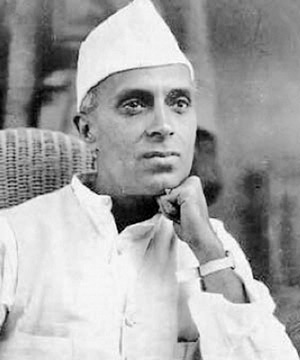|
Pandit Shri Jawaharlal Nehru:
A pioneer architect of modern India
By Premasara Epasinghe
No great man lives in vain. The history of the world is but the
biography of great men. - Thomas Carlyle.
Jawaharlal Nehru (1889-1964), Indian nationalist politician, Prime
Minister from 1947, was one of the greatest statesmen in the world.
Before the partition, the division of British India into India and
Pakistan, Nehru led the socialist wing of the Indian Congress Party. He
was second in influence only to Mahatma Gandhi.
Nehru was imprisoned nine times by the British from 1921 to 1945 for
political activities. As Prime Minister from the creation of the
Dominion, later Republic of India in August 1947, he originated the idea
of Non-aligned policy, neutrality towards major powers. He was also a
great thinker and philosopher.
|

Shri Jawaharlal Nehru |
He was educated in England at the University of Cambridge. He
succeeded his father Motilal Nehru (1861-1931) as president of the
Indian Congress Party. Nehru and Mahatma Gandhi led the nationalist
opposition to British rule in India. He was a highly respected leader of
the Third World.
Birth
Shri Jawaharlal Nehru was born in Allahabad, India, on November 14,
1889. He was the only son of prosperous parents. His two sisters were
very much younger than Nehru. The Nehrus were Kashmiris. Over 200 years
ago, early in the 18th century Nehru's ancestors came down from the
mountain valley to seek fame and fortune in the rich plains below. For
some years, the Nehru family lived in Agra and it was there,
Jawaharlal's father Motilal was born in May 1861.
When Jawaharlal was 10, his father moved into a bigger house 'Ananda
Bhawan'. It had a big garden and a swimming pool. When Jawaharlal was
11, a new resident tutor Ferdinand T. Brooks was recommended by a
Theosophist, Annie Besant.
He taught Nehru, English and Latin. Brook, developed in him a taste
for reading. There was also an old Pandit, who taught him Hindi and
Sanskrit. Annie Besant was a great influence on Nehru. At 13, he became
a member of Theosophical Society and he attended the Theosophical
Society Convention at Benares and met Colonel Henry Steel Olcott.
When Nehru was 15, he proceeded to England with his baby sister. He
entered the prestigious Public School Harrow. Later he entered the
University of Cambridge. He studied chemistry, geology and botany.
Indians in Cambridge formed a society called 'Majlis'. They discussed
political problems of India. Leading Indian politicians such as Bepin
Chandra Pal, Lajput Rai and G.K. Gokhale visited them at Cambridge.
Jawaharlal left Cambridge after obtaining his degree. Then he studied
law. In 1912 he was called to the Bar and back in India practised at the
Indian High Court.
In December 1916, Nehru, for the first time met Gandhiji in Lucknow.
He was a hero and the Indians admired Gandhi at first, for his heroic
fight in “Apartheid South Africa.”
Nehru's marriage took place in 1916 in Delhi on 'Vasantha Panchami'
day which heralds spring in India.
At the end of the World War II Indian industrialisation spread and a
new capitalist class had grown. Nehru can be considered a great icon in
the Indian history as one of the pioneers or an architect of modern
India.
Nehru wrote three classics Glimpses of World History, An
Autobiography and The Discovery of India.
The Indian flag was adopted shortly after the country gained
Independence from British in 1947. The saffron orange represents India's
Hindu people, the green stands for Muslims and white symbolises the
peace between them. Central wheel is a Gandhian symbol of
self-efficiency.
Nehru was no ordinary head of State. He gave leadership to free his
country from the British imperialism. He was undoubtedly the greatest
Prime Minister India produced in its history.
Given below an extract from his speech:
“At the stroke of the midnight hour, when the world sleeps India will
awake to life and freedom.
At this solemn moment, we take the pledge of dedication to the
service of India and her people and still to the larger cause of
humanity.
We end today a period of ill fortune and discover again that freedom
and power bring responsibility. The service of India means, the service,
the service of the millions who suffer. It means, the ending of poverty,
ignorance, disease, and inequality of opportunity. The ambition of the
greatest man of our generation has been to wipe every tear from every
eye.
On May 27, 1964, Nehru, the great philosopher, visionary, statesman
and world leader passed away. |

